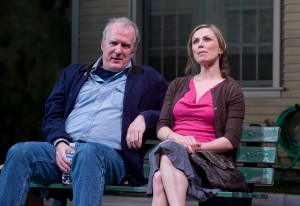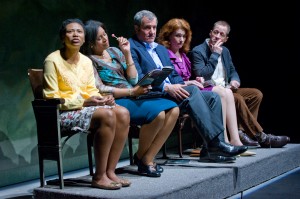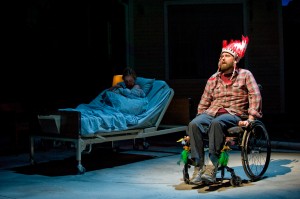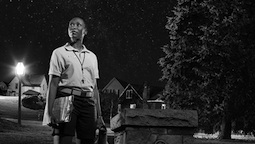STEPPENWOLF PROVES ITS WORTHY REPUTATION
Will Eno’s Middletown suggests that life is a black hole; there will always be a gulf between reality and our perception of it, between our desire for human connection and our ability to actually connect. Loneliness pervades this small mid-American town. Yet in a beautiful production, Steppenwolf fosters an inspiring sense of ensemble that makes the play’s fleeting moments of embrace truly resonate.
 Eno’s play comprises an almost Stoppardian vastness, shuttling from the grounded philosophy of a landscaper planting a tree in the town square to an astronaut contemplating the world from outer space. But the everyday philosophers of Middletown – defined by their positions as tour guides, librarians, or janitors rather than by their names – are always self-conscious about their philosophizing; just as soon as they reach some poetic truth about the world, they playfully withdraw from the pretention of ever really being able to know. Eno’s script is an awe-inspiring piece of hyper-realist poetry: not precisely linear, filled with direct audience address, echoing Thornton Wilder’s Our Town in both subject and style.
Eno’s play comprises an almost Stoppardian vastness, shuttling from the grounded philosophy of a landscaper planting a tree in the town square to an astronaut contemplating the world from outer space. But the everyday philosophers of Middletown – defined by their positions as tour guides, librarians, or janitors rather than by their names – are always self-conscious about their philosophizing; just as soon as they reach some poetic truth about the world, they playfully withdraw from the pretention of ever really being able to know. Eno’s script is an awe-inspiring piece of hyper-realist poetry: not precisely linear, filled with direct audience address, echoing Thornton Wilder’s Our Town in both subject and style.
 The heart of the play is an archetypical couple. Mary Swanson (the lovely Brenda Barrie) has just moved to Middletown to start a family with her husband, a traveling salesman who is perpetually out of town. Mary starts to befriend an isolated neighbor named John (the magnificent Tracy Letts) – but their relationship is never fully consummated. Inhabiting separate suburban houses on opposite sides of Antje Ellermnan’s evocative set, Mary and John continually fail to express how much they need one another’s company. Their relationship is predicated on pregnant pauses, gaps, and silences: a series of missed communications. Words fall short in their most touching moments, when John’s flushed face or Mary’s embrace “say” what the characters fail to tell one another.
The heart of the play is an archetypical couple. Mary Swanson (the lovely Brenda Barrie) has just moved to Middletown to start a family with her husband, a traveling salesman who is perpetually out of town. Mary starts to befriend an isolated neighbor named John (the magnificent Tracy Letts) – but their relationship is never fully consummated. Inhabiting separate suburban houses on opposite sides of Antje Ellermnan’s evocative set, Mary and John continually fail to express how much they need one another’s company. Their relationship is predicated on pregnant pauses, gaps, and silences: a series of missed communications. Words fall short in their most touching moments, when John’s flushed face or Mary’s embrace “say” what the characters fail to tell one another.
Eno continually points to the limits of language, which is both a mode of human connection and a symbolic construct that estranges us. Middletown particularly plays in the realm between silence and speech, probing the affective properties of sound. From the cries of a newborn baby to a dying gasp, life has a definite beginning and end, but the middle – life itself – can be a sonic muddle. Les Waters’ direction juxtaposes this pervasive sense of estrangement from self and others with the fleeting, charged potential of human connection. The simple act of being present for another human being and the engaged act of listening take on amplified resonance throughout the play. Steppenwolf’s ensemble is an example of this beautiful potential of connection; the cast is remarkably grounded, open and receptive to both their fellow cast members and the audience.
 In a particularly meta-theatrical moment, Eno even writes “the audience” as characters in Middletown these quirky figures sort through their perceptions of the play so far and share their divergent anticipations of what might come next. Through this self-reflexive moment, Eno foregrounds the audience’s presence, attention, and engagement as essential to theater’s ongoing life and vitality.
In a particularly meta-theatrical moment, Eno even writes “the audience” as characters in Middletown these quirky figures sort through their perceptions of the play so far and share their divergent anticipations of what might come next. Through this self-reflexive moment, Eno foregrounds the audience’s presence, attention, and engagement as essential to theater’s ongoing life and vitality.
Theater is often characterized by its relationship to human mortality; both are ephemeral, living only in memory once the performance has concluded. Although the play eventually draws to an end and the audience files out of the theater, Middletown offers a luminous moment of connection in the middle of the audience’s own lives. With a playful and poetic wink from the brilliantly unified ensemble, this play may even draw us a little closer to grasping the muddled meaning of life.
stellis @ stageandcinema.com
photos by Michael Brosilow
Middletown
ended its run at the Steppenwolf Theatre on August 14
for future Steppenwolf productions, visit http://www.steppenwolf.org/
for info on this and other Chicago Theater, visit http://www.TheatreinChicago.com
